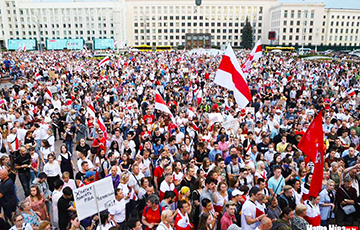Belarusians Achieved A Lot
12- 2.10.2020, 12:25
- 94,632

And Lukashenka lost everything.
“Boss, everything is lost, everything is lost!”
This meme from the movie “The Diamond Hand” can become the chorus of the “mourners for the revolution” who theorize about Khabarovsk and Belarus. They sympathize with the protests. But they see that neither the Khabarovsk nor the Belarusian protests have achieved their goal. Hence their groans: everything is meaningless; peaceful protest cannot win, and discredits itself. A revolution without violence and victims on the part of the protesters is doomed - these “mourners” say from a safe distance.
Indeed, the Khabarovsk residents did not force Moscow to return governor Furgal to them. The Belarusian protest did not achieve its goal either: Lukashenka stayed, having usurped power.
But does this mean that both protests were meaningless? Everything is much more complicated.
“Khabarovsk” and “Belarus” are not like the social explosions of Latin America, or the Maidan, or the East European revolutions. “Khabarovsk” and “Belarus” are taking place under the conditions of the regimes that have considerable (and in Russia - huge) potential. A flowing protest, albeit massive, but devoid of organization, is not capable of leading to a transformation of power.
And yet, even when faded, these protests - each in its own context - are unprecedented. They undermine the viability of the ruling systems. They form the social and cultural environment of the future social upheaval, which acquires genetic experience.
Moreover, a peaceful protest puts a system oriented towards submission and incapable of compromise in a desperate situation. Sooner or later, the system is forced to become brutal, provoking social rejection.
Can it be called a defeat that Khabarovsk, in a situation of paralysis, which Russia is in, suddenly becomes a Systemic Challenge for the Kremlin? The authorities understood this challenge, trying to cleanse the regions from any alternatives during the recent “elections”. The bitter irony is that this cleansing is ramming the field to repeat the Khabarovsk “movement” in other places.
The Khabarovsk Territory itself - even if the people leave the streets - will remain hostile to this government. A radical minority has appeared in the province, ready to become the core of future rallies. Moreover, the lack of the ability to legally channel the moods - through elections and political movements - is pushing the future Russian protest into the streets.
So, the situation is as follows: the protest in the Khabarovsk Territory did not win, but the government lost, losing the region. From now on, “Khabarovsk” is a warning to the Kremlin about the possible or the inevitable.
It's even clearer in Belarus. Lukashenka retained power. But what is power over a country that hates you ?! And is this power, if it needs to be asserted secretly?
The Kremlin understands that, having supported the falling Lukashenka, it created a trap for itself. On the one hand, the Kremlin cannot allow even the unloved Lukashenka to fall under the pressure of protest - since it will be a bad example to follow. On the other hand, Russia's support for the Belarusian usurper provokes anti-Russian sentiments among Belarusians. And then there is international rejection, which ruins Moscow's long-suffering hope of normalizing relations with the West. So, for the Kremlin, Belarus is more of a problem (with all the tactical gains).
Lukashenka himself lost everything: his reputation, his role in the national history, influence on the country, personal security, a guarantee of loyalty on the part of the elites. Belarusians demonstrated a unique phenomenon - spontaneous but conscious unity of the people and amazing self-organization. Not every nation is capable of this. Refusal to respond with violence to the violence of the authorities is more a manifestation of self-control than fear and resignation.
The maturation and politicization of the civil society in Belarus is proceeding faster than the formation of a political opposition. It is worse when there is opposition, suffocating in an atmosphere of social passivity.
Meanwhile, Belarusians have achieved a lot. They not only relegated their “agrofuehrer” to the role of hostage of both their security officials and the Kremlin. They have proven that they have become a civil nation with dignity and a willingness to collectively defend themselves. They turned Belarus from a blank spot on the map into an international factor, waking up a dormant Europe.
Of course, European sanctions against 40 representatives of the Belarusian authorities are unlikely to affect official Minsk. Lukashenka will also ignore the EU's demand to agree to OSCE mediation and to enter into dialogue with the protesters. But slow-to-start Europe has done two things that will matter. First, by not recognizing Lukashenka as a legitimate president, Europe has reduced his maneuvering space in the Kremlin hallway, in which he will wait for Putin's reception. Secondly, Europe began to prepare for Lukashenka's departure by starting to develop a “comprehensive plan of economic support for democratic Belarus”.
Belarusians will not return to their old rut. Russia will have to say goodbye to the dreams of the union state. Europe will have to think about what Belarus can mean for the European security and European principles.
So it's too early to sing a requiem for the current protests. Saying "everything is pointless" at the moment when people take to the streets despite the threat to their lives, is a sign of moral insensibility. This whining also speaks of myopic perception of events.
Yes, more often than not, popular protest does not achieve immediate victory. But the power switched to screws tightening thus admitting its own strategic defeat.
So, let's give credit to those who teach us courage. Let's not teach them how to make revolutions. We will try to comprehend the Khabarovsk and Belarusian experience, which goes beyond the dogmas to which we are used to.
Lilia Shevtsova, Facebook









